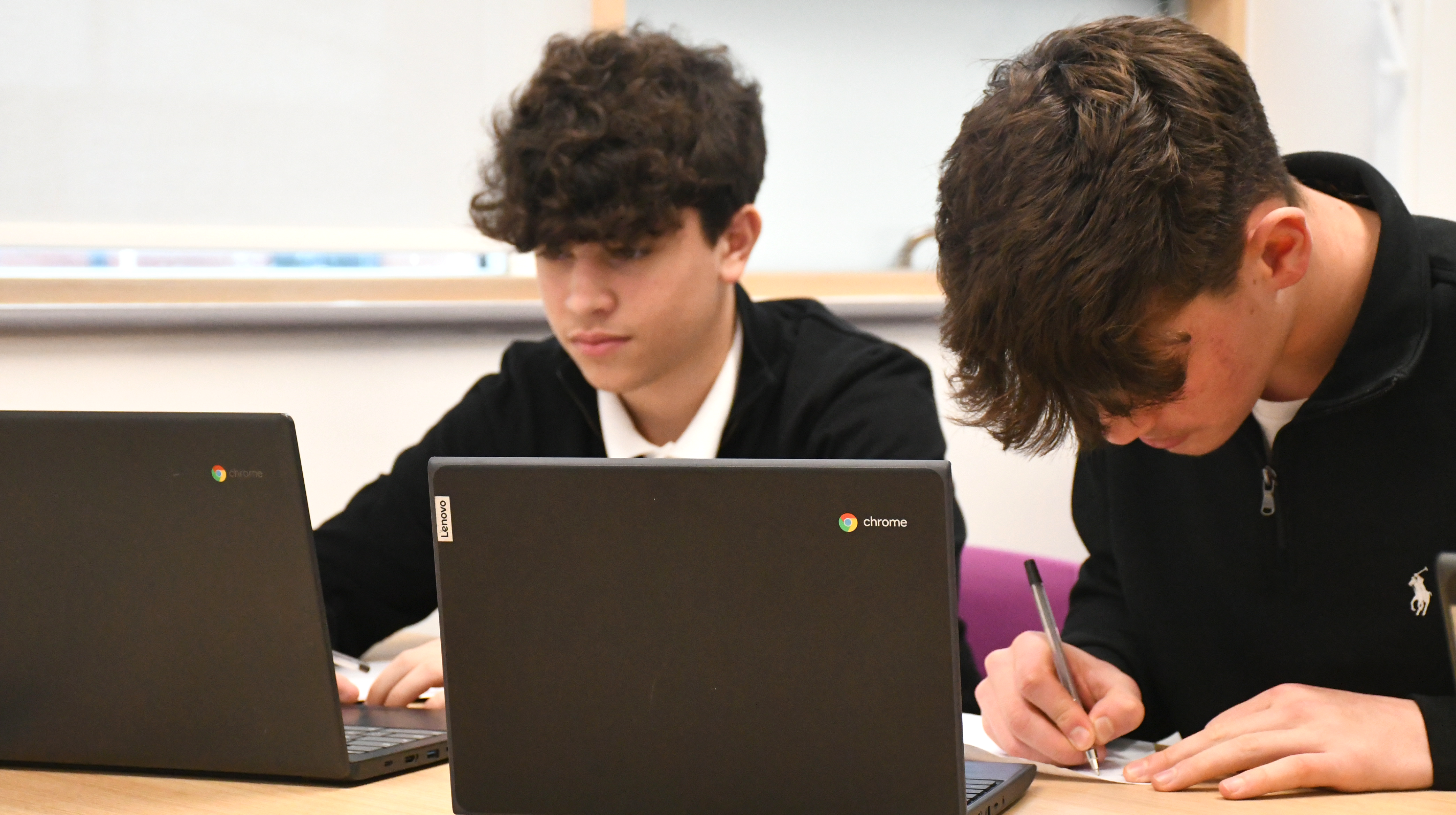Successful Study Habits and Recommendations at KWSixth
Study Skills
Prior to Year 12, all Katherine Warington School students have multiple opportunities to develop their study skills and cement positive study and revision habits into their routines.
From KS3, students are prepared for their end of year examinations through a series of workshops covering:
- Retrieval Processes
- Interleaving
- Time Management
Subsequent to this, at KS4 all students complete the Study Skills, Careers, and Community module as part of their Period 7 weekly sessions in Year 10. This option, not only develops our students by engaging them in society, community, and culture, but allows the school to expose students to multiple streams of revision techniques – to further personalise the revision experience. During this time, we also engage outside professional services – mainly Elevate Education – to provide additional opportunities to develop our students study habits. We cover topics such as:
- Structuring positive learning environments
- Time-based study methods
- Visual literacy
- Stretching vocabulary and literacy in extended written response
- Using examiner reports and board specification
- Study groups
- Positive study behaviours
- Utilising feedback
As the classroom environments change in KS5, and students take on more responsibility with regard to their education, it is paramount that each student develops appropriate revision and study techniques to provide them with the tools for success.
The following booklet is a collection of tips, recommendations and evidence-based literature that students will need to apply to provide them with the best shot at success in KS5. Upon completion of reading the materials below, please also complete the students workbook,
which is part of your accompanying materials prior to entry at Sixth Form.
Study Skills for KS5 and Sixth Form
1. Time Management
As part of our whole school revision, we advocate for the Memory Clock approach, which demonstrates to students how they can review information and revise within an hour limit to optimise their time and potential. There is clear scientific evidence to suggest that a student’s active attention span at KS4 (relative to their physical age) is approximately 17 minutes in length, therefore through segmenting their time they can accomplish several smaller revision tasks while maintaining active attention.
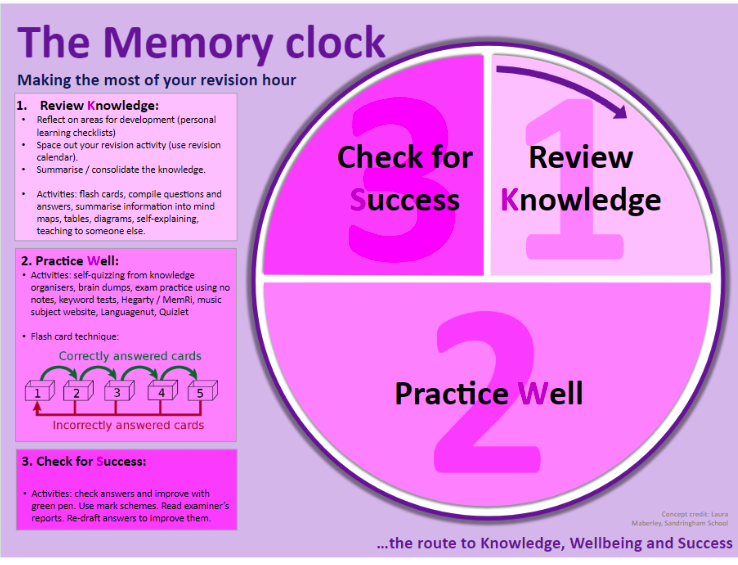
Similarly, we make students aware of the Pomodoro Method – which has several similarities to the Memory Clock and advise students to create tailored tasks to better prepare them for upcoming examinations and mock examinations.
Complete the materials below:
- Study Timetable Template
- Memory Clock Template
To demonstrate your understanding of time management prior to the beginning of your KS5 journey.
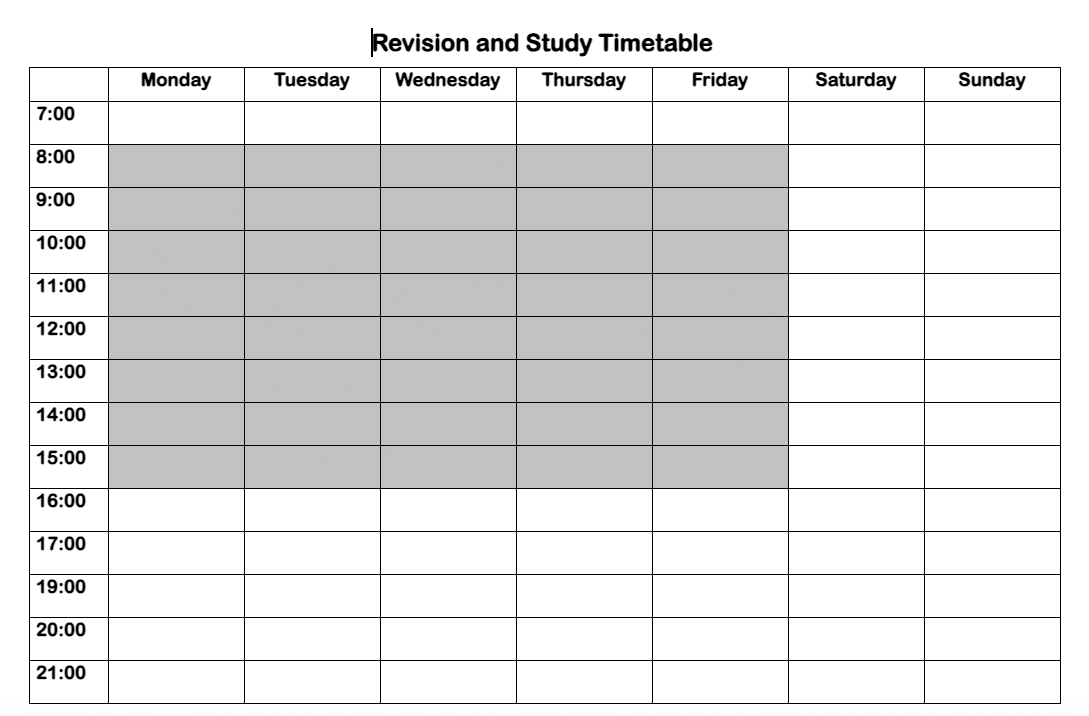
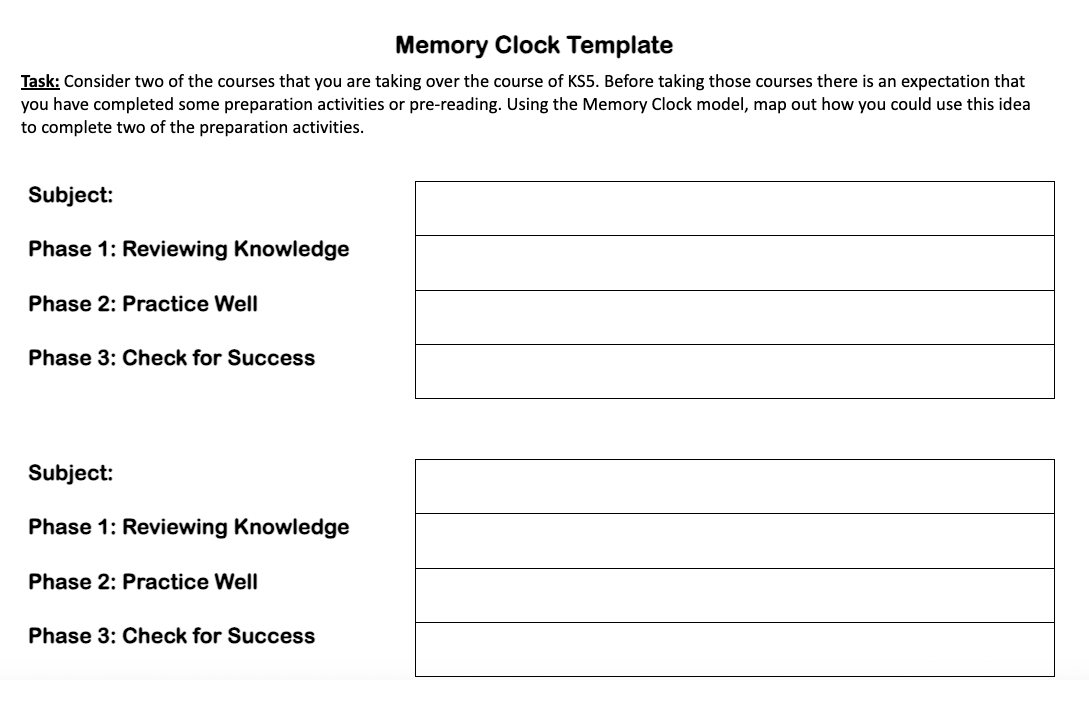
2. Study strategies and practical tips
Revision is not a one-size-fits-all process, which means it can be hard for students to find the most effective method for success. Below are four of the effective methods that we discuss and encourage students to use, which can easily be applied to your KS5 journey. Attached below is also a note-taking section for each of the methods that needs to be completed upon entry to Sixth Form.
Visual Literacy
Visual Literacy refers to the practice of using visual aids (either previously prepared or completed through an exercise) to assist with learning, memory, and revision. Visual literacy can take several forms, but ultimately aids the student in building memory pathways through flexible and adaptive means.
Students who actively engage in visual literacy as a technique of revision demonstrate:
- Increased use of sophistication communication
- Stronger critical thinking skills
- Increased creativity and creative thinking
- Higher levels of confidence in subject matter and application
Visual literacy can be used in a variety of ways when studying and revising subject matter. Visual literacy can take the form of using pictures or images in your flashcards to use visual reminders to connect complex ideas. Similarly, creating notes that are visually stimulating (for example: using graphic organisers, visual concept mapping, infinite electronic whiteboards) to help to organise and chuck large topics or pieces of coursework into more manageable sub-sections.
Study Groups and shared responsibility
As the proverbial saying goes, ‘a problem shared is a problem halved’ and for educators and students, a concept shared and re-taught between students is a concept known. This is way effective study groups (when run appropriately) can have such a profound impact on student learning. Study groups refer to a previously arranged group of students meeting to discuss and share the revision load effective, for the benefit of all students involved.
Effective study groups involve separating a subject’s workload and revision tasks across a group of people, which is then completed by each of the individuals before returning to share the knowledge and resources gained along the way. While study groups often acquire a negative reputation due to poor management on the part of the students involved, effective study groups demonstrate:
- Increased levels of retention of concepts: There is more cognitive strain that goes into explaining a concept to a group of individuals, meaning that not only does the group become informed of the topic, but the presenter has a greater understanding of the topic as well.
- Added motivation to all students
- Greater student engagement with resources and additional subject materials
While there are many benefits to study groups, it is clear that study groups are not appropriate or some subjects, or for some areas of subjects. Similarly, a study group is only as strong as its weakest link, so it is crucial to consider the composition of the group, if you would like to pursue a revision technique that prioritises shared responsibility.
Pre-Reading and Immersive Experiences
Pre-reading (the act of exposure to a concept or knowledge prior to the formal lesson occurring) or engaging in immersive experiences (additional readings, viewings, or opportunities that deepen your understanding of a topic) can dramatically change the students understanding and complexity of understanding of a topic.
Imagine you have a bucket in front of you. This bucket symbolises your knowledge and understanding of a chosen subject. By the end of your journey, you need to make the bucket as ‘full of knowledge’ or heavy as you can. Your lessons and home learning opportunities or your huge rocks that will fill approximately 60% of your bucket. But what about all the space that is left out of at the bottom of the bucket, which is too small or the large rocks. This is where your pre-reading and immersive experience come into your revision. For every one of these experiences, you are filling your ‘bucket’ with sand. Heavy, resourceful, sand – that can adapt to fill every space inside your bucket.
This is the purpose of these exercises, they build your knowledge of topics and provide you with implicit skills in cognitive processing, vocabulary, creative reasoning, communication and verbal processing.
Adaptive Flashcards
Flashcards are a tried and tested method of revision and retention, however,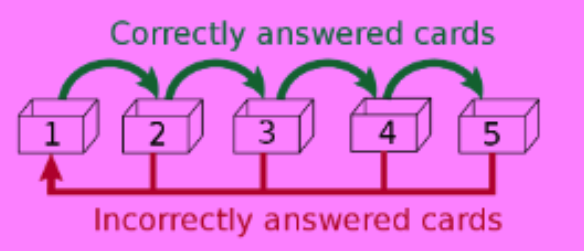 they can often become repetitive or poor used leading to a general lack in use. Through adapting the use of your flashcards, you are able to utilise the previous effort that you have put into making and constructing your flashcards without the benefit of using them wearing off over time.
they can often become repetitive or poor used leading to a general lack in use. Through adapting the use of your flashcards, you are able to utilise the previous effort that you have put into making and constructing your flashcards without the benefit of using them wearing off over time.
One of the methods, which was featured on the Memory Clock diagram, is split your flashcards into different sections based on the accuracy of your understanding of the flashcards. For example, your flashcards could be split across three different piles, those you need to review daily, weekly, and monthly. If at any point you review a weekly or monthly stack and you have forgotten the information pertaining to that flashcard, you are to downgrade the flashcard so that it has to be reviewed more frequently.
In a similar vein, you can use your flashcards more creatively by pulling two flashcards from a certain topic and have to find a connection between those two concepts, similar to the idea of six degrees of separation.
By utilising your flashcards in new and inventive ways, students are actively building:
- Strong, adaptable neuro-pathways
- Creative and Critical Thinking Skills
- Resilient revision methods
- Timely responses that can better prepare them for examinations
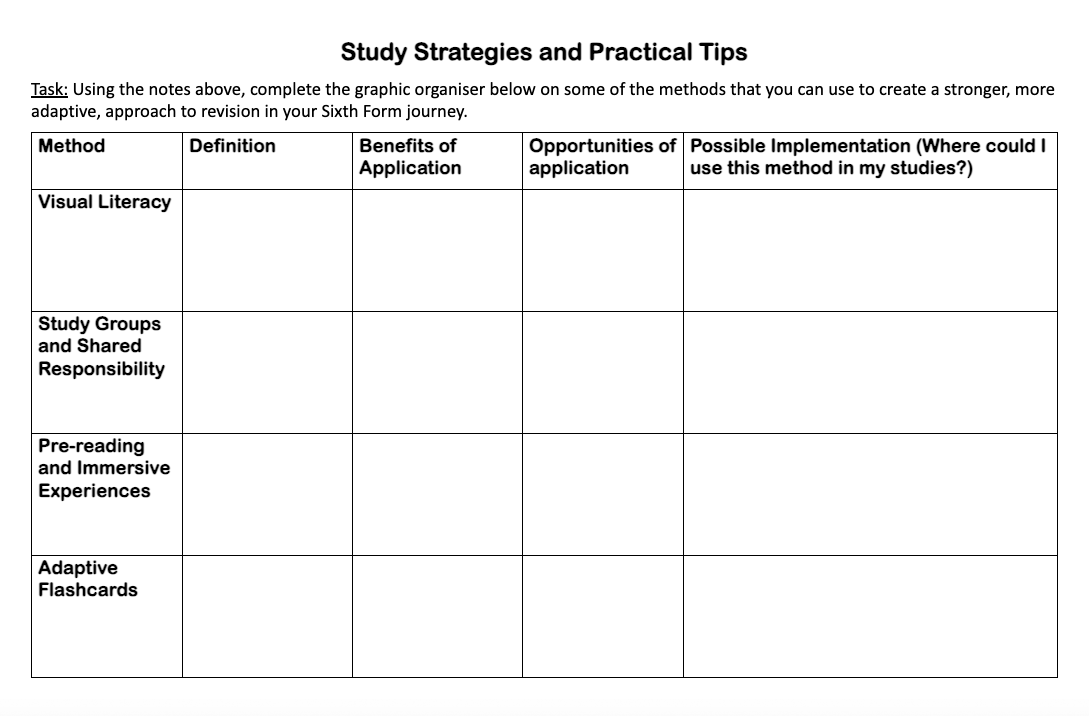
3. Effective note taking
Unlike, your KS3 and KS4 studies, Sixth form relies on independence and individual determination, especially with regard to note taking. Being able to complete, collect, and collate your notes is the responsibility of the student and will determine their success as they progress in their KS5 journey.
Sixth form much like KS4 culminates in a set of final examinations and a student who consistently creates notes and study materials that effectively capture knowledge and understanding score consistently higher than those who do not.
Determining an effective note-taking and collation method is a personal choice and preference, however, we recommend the Cornell Method as it allows:
- Collation of vocabulary and definitions
- Division of information by key questions or learning objectives
- Purposeful summaries
- In-built opportunities to revise and determine areas of improvement
Effective Note-taking: Writing
While completing and sticking to your revision timetable will benefit you, as a student, in your Sixth Form journey, you will never reach your true academic potential without a rigorous and effective note-taking system. There are multiple note-taking methods that students can use and as students develop more autonomy, self-determination, and responsibility for their learning, it is crucial that students find a note-taking method that it appropriate for them.
There are many note-taking strategies that students may want to consider during their time in Sixth Form, these could be:
- The outlining method
- Mapping method
- Charting Method
- Sentence Method
However, we would recommend considering the Cornell Method, which is highly recommended for its clear organisational structure, simple and effective layout, and focus on implicit literacy skills.
The Cornell method encourages students to save time and effort by collecting notes as succinctly and efficiently as possible the first time. Similarly, it also has an in-built reviewing system within its page design that reminds students to complete a summary after the completion of the lesson.
Consider the template below, which details the method and its separate sections for your consideration.
Effective Note-taking: Reading
When it comes to course readings and preparation for lessons, we suggest that students engage in the 10% summary rule to help chunk textsand ideas into smaller more manageable pieces. This is especially important for students who often find issues with their short or medium-term memory and also for students who have dyslexia or dyspraxia.
The concept is very simple, but it is often the simple things done well that have the most impact. Additionally, students can use the 10% summary tool with long pieces of complex texts, or can use it on short paragraphs of writing to add their memory.
When completing a 10% summary, it is crucial to implement the START approach, which stands for:
S – Source (Author and Title of the text)
T – Target (Purpose, meaning, and context of the text or idea)
A – Academic Language (Key vocabulary and understanding)
R – Rhetoric (How is the piece written and how is that communicated?)
T – Topic (how does this work fit into the greater unit of work?)
Through using this method while discussing complex texts and pre-reading exercises, students can clearly identify a purpose and build pathways between home learning exercises, pre-reading, and complex ideas in lessons.
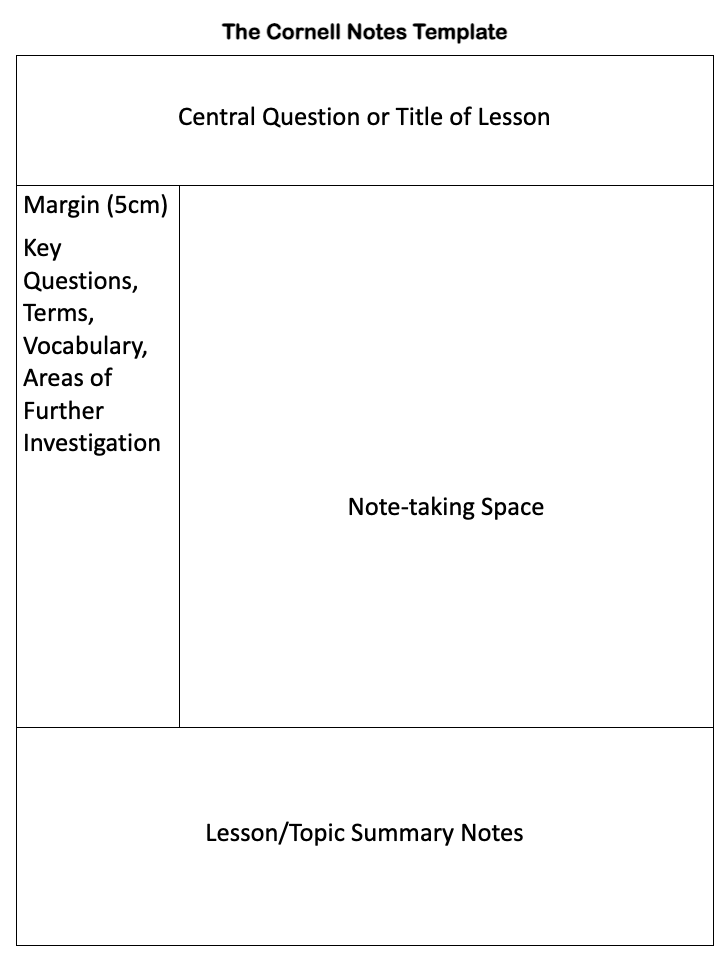
4. Exam prep-stress management and well-being
Purposeful Well-being
Students are like athletes, they spend a large amount of time training in order to accomplish a certain goal under time constraints. Much like an Olympian who spends multiple decades preparing for their one opportunity to represent their country. It can be an incredibly stressful time and often leads to students ‘burning out’ right before crucial pitch-points in their journey.
To combat that, we recommend students to actively try and incorporate aspects of Andrew May’s ‘Recovery Rocket’. In particular, we encourage students to acquire 100 recovery points pre-week to aid in their emotional, physical and mental recovery. While May’s program is more complex than just this one aspect of the program, it is a new way of considering recovery and is incredibly applicable to our students.
Students are given a list of recovery options, see below and it is expected that students reward themselves with recovery points when they complete these activities. Each activity has been scaled to correlate with the amount of positive self-care it actually provides for the students.
Students who actively reach 100 recovery points every week, often feel more fulfilled, more resilient to pressure, and have a great sense of school-life balance.
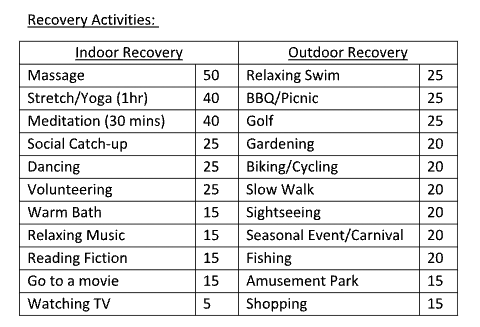
Using the study timetable task that was completed earlier in the booklet, consider scheduling some of
these activities into your week so that you can achieve your well-being goal for the week.

